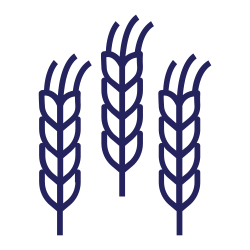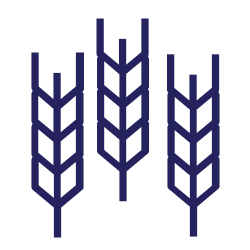Section Title
Maximizing feed barley yield while minimizing lodging
Crop Types
- Barley
Background
The most commonly grown feed barley varieties are between six to twenty years old. However, the recent registration of new barley varieties with promising yield improvements may be opportunities for growers to significantly increase feed barley production. This project would increase adoption of improved barley cultivars on farm and also may make plant growth regulator (PGR) management practices more efficient.
Objectives
- Understand how barley cultivars with different genetic traits respond to PGR applications.
- Explore PGR application timings on feed barley to consistently minimize lodging while maximizing yield and quality.
- Determine production efficiencies by tank-mixing PGRs with herbicides and foliar fungicides.
- Establish the yield and yield variability of newly registered barley varieties, grown under intensive agronomic management, under a range of soil types and agro-climatic conditions, and their subsequent suitability for widespread adoption
Related Production Resources
Manitoba Crop Alliance’s production resources provide reliable agronomic information based on the latest research. Our resources have been developed to help farmers make productive and sustainable decisions on their farms throughout the growing season.
Related Research Projects

-
Start Date: 2019
-
Completion Date: 2022
-
Project Status: Completed
Currently evaluation of moisture resilience by variety is not available for producers, in spite of moisture being the most probable cause for yield reductions. This project will evaluate the performance of MCVET varieties under extreme moisture conditions. Read More

-
Start Date: 2021
-
Completion Date: 2023
-
Project Status: Ongoing
Generating barley varieties with enhanced FHB resistance is complex because multiple fungal compounds and plant genes influence disease severity. We recently discovered a fungal compound called gramillin that promotes FHB severity in barley and is toxic to plants, killing cells… Read More

-
Start Date: 2021
-
Completion Date: 2023
-
Project Status: Ongoing
Preliminary observations in Dr. Bakker’s lab have revealed that there are trichomes on the inner surface of the hull; these have never been explored for potential interactions with Fusarium growth. Using field-grown barley, including multiple different lines and varieties, we… Read More
-
Start Date: 2021
-
Completion Date: 2024
-
Project Status: Completed
This project aims to establish a simple, rapid and cost-efficient seed testing protocol by using a novel technique, named loop-mediated isothermal amplification (LAMP). Meanwhile, a greenhouse/growth cabinet disease evaluation method will be developed to screen barley germplasm for resistance, and… Read More

-
Start Date: 2020
-
Completion Date: 2025
-
Project Status: Completed
The deliverables of this project will complement other national and international efforts for the identification of virulence genes in F. graminearum, which are mainly focused on reverse genetic studies, meanwhile it exemplifies the necessity of integrating forward and reverse genetics… Read More

-
Start Date: 2020
-
Completion Date: 2026
-
Project Status: Ongoing
This project will maintain progress in breeding improved DON resistant barley varieties and to identify new tools to breed for DON resistance. Read More

-
Start Date: 2020
-
Completion Date: 2024
-
Project Status: Ongoing
This project will look at the effect of foliar fungicide strategies on the mitigation of FHB in barley. Read More

-
Start Date: 2022
-
Completion Date: 2026
-
Project Status: Ongoing
Markers developed in this proejct will accelerate the breeding process and make trait monitoring more accurate and cost effective over traditional phenotyping. Improved resistance to FHB will protect the producer's grades as well as milling and baking quality of Canadian… Read More

-
Start Date: 2022
-
Completion Date: 2026
-
Project Status: Ongoing
This project aims to begin rating commercialized Canadian varieties for competitiveness. In addition it will allow development of a methodology to take competitiveness testing forward into a framework such as the regional variety trials to continue rating of registered varieties… Read More

-
Start Date: 2022
-
Completion Date: 2025
-
Project Status: Ongoing
The proposed research is aimed at identifying germplasm lines and novel candidate genes/molecular markers that provide a unique opportunity for efficient and directed breeding of malting barley cultivars with optimum dormancy. Read More

-
Start Date: 2021
-
Completion Date: 2024
-
Project Status: Ongoing
Diseases are one of the biggest foes associated with barley production in Canada; Fusarium head blight (FHB) in particular is the most dangerous as it produces mycotoxin in the grain thus affecting malting and marketing. This project has multi-faceted benefits… Read More
-
Start Date: 2021
-
Completion Date: 2022
-
Project Status: Completed
This project is a proof of concept for long-term potential development of new biodegradeable fungicides for field applications. Read More

-
Start Date: 2018
-
Completion Date: 2023
-
Project Status: Ongoing
A better understanding of the factors responsible for the shift in Fusarium population and differences in trichothecene chemotype composition will enable the prediction of future population distribution, possibly related to future changes in climate. Fusarium chemotype diversity may be driven… Read More

-
Start Date: 2018
-
Completion Date: 2019
-
Project Status: Completed
This project investigated the gene expression of several barley varieties when under waterlogging stress. Read More

-
Start Date: 2016
-
Completion Date: 2020
-
Project Status: Completed
This project will produce information for breeders that will help optimize grain dormancy and maintain malting and storage quality, while allowing good seed germination. Read More
-
Start Date: 2017
-
Completion Date: 2018
-
Project Status: Completed
Understanding genetic differences toward disease resistance and reduced toxicity will be useful in long-term plant breeding. Read More

-
Start Date: 2015
-
Completion Date: 2019
-
Project Status: Completed
The research is anticipated to have an applied component that should assist barley breeders in developing FHB resistant germplasm. Increase in the development rate of resistant varieties and decrease in breeding expense would allow for quicker release of new varieties… Read More



